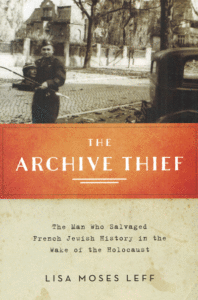The Archive Thief: The Man who Salvaged French Jewish History in the Wake of the Holocaust, by Lisa Moses Leff, Oxford, 304 pages, $29.95
Reviewed by NEAL GENDLER
Self-taught historian Szajko Frydman gained fame among scholars for his achievements in preserving history from Europe’s lost Jewish world, but his obsessive zeal and need for income led him to disgrace.
“Some of what he did was celebrated as heroic acts of Judaica rescue, but other transfers were clearly thefts,” says author Lisa Moses Leff.
The essential question in The Archive Thief is whether Frydman’s recovery of overlooked records outweighed the damage he did by dispersing them “across three continents, a virtual diaspora of documents.”

For decades, Frydman made forgotten records available for research, donating or selling “hundreds of thousands of pages of rare documents and a substantial number of published books and periodicals directly to… research libraries specializing in Judaica,” Leff says.
Buyers may have included Yeshiva University, Hebrew Union College, the Jewish Theological Seminary, Israel’s Central Archives for the History of the Jewish People, Brandeis and Harvard, Leff says.
Frydman, born into Polish poverty in 1911, ended school at age 16, moving to France. Yet he became an expert in details of centuries-ago French Jewish life, appearing “in the top Jewish history journals in English, Hebrew and Yiddish,” says Leff, who teaches history at American University in Washington, D.C. He published more than 200 scholarly articles in five languages and wrote several books, mostly under the invented name of Zosa Szajkowski (shy-KOV-ski), which Leff uses throughout.
In the 1930s, working in Yiddish as a journalist, he fell under the mentorship of Elias Tcherikower, archivist for YIVO (Institute for Jewish Research), which “saw itself as the national university for the Yiddish-speaking world.”
During and after World War II, Frydman uncovered substantial community histories and other neglected archival materials, shipping them to YIVO in New York. Among many Jewish historians, “salvaging archives was understood as tantamount to rescuing national treasures,” Leff says.
War’s outbreak left Frydman stateless; fearing deportation, he joined the French Foreign Legion. Gravely wounded in 1940, he partially recovered in the Carpentras region and “with the nose for sources that would become his trademark,” gathered information on once-thriving French Jewish life, including 18th century genealogy and death records.
YIVO got him on a list of prominent people for a U.S. visa. Reaching New York in September 1941, he soon enlisted, eventually becoming an 82nd Airborne paratrooper dropped into Normandy the night before the invasion.
In 1945, his language skills put him at U.S. headquarters in Berlin. Nazi papers were abundant, “and he collected them with relish,” sending YIVO hundreds of boxes. An important achievement was finding records of France’s wartime umbrella organization for Jewish welfare — records France had ordered destroyed.
By 1961, he was a member of the American Academy for Jewish Research and “widely regarded as a leading expert in modern Jewish history,” Leff says. Lacking degrees, he wasn’t offered professorships and survived on a modest YIVO salary, small grants and selling archival materials, further dispersing documents and leaving holes in archives.
As early as 1948, Frydman raised suspicion, and in 1961, he was caught stealing from city archives in Strasbourg, France. Sentenced in absentia to three years’ prison, he turned his attention to Eastern Europe. In 1978, he was arrested with documents stolen from the New York Public Library. A few days later, at the age of 67, he was found dead.
Leff’s information-crammed writing is clear, though not a quick read. Frydman’s life details are a bit thin for a book, even if only 204 pages (subtracting acknowledgments, notes, sources, bibliography and index). The Archive Thief’s value is bringing this very interesting story to light, and telling us how archives operate and shape our view of the past.
A bonus is Leff’s account of postwar recovery and disposition of millions of Jewish books, archives and Judaica. When redistribution ended in 1948, some 500,000 remained heirless.
Leff says Frydman’s collecting “built on a long-established rhetoric of scientific salvation, in which the scholars are depicted as the heroic rescuers of forgotten treasures decaying in obscurity in far-away places where no one is left to appreciate them.”
***
Neal Gendler is a Minneapolis writer and editor.
(American Jewish World 8.14.15)



















